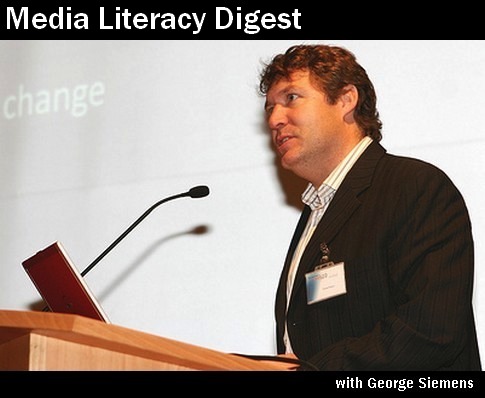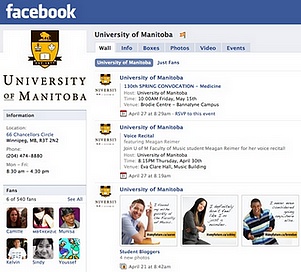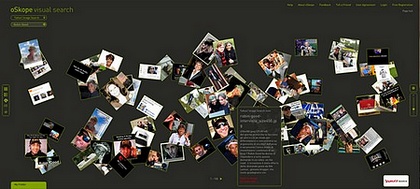Media Literacy: Making Sense Of New Technologies And Media by George Siemens
Inside this Media Literacy Digest: If you are into understanding how technology improvements are shaping new and different paradigms in the way we conceive and experience education, this weekly digest provides you a good set of pointers, facts and resources to make sense of the challenges that awaits our society in a not-so-distant future. Here all the details: learning, networks, knowledge, technology, trends by George Siemens Becta has published a new report Analysis of emerging trends affecting the use of technology in education. The report does not contain anything significantly new, but provides a good overview of current trends in information technology (in particular, multimedia habits, mobile technologies, parental encouragement of educational use of tools, and growth of TV on demand). Growing awareness of trends impacting education is important. More attention is being paid to trends today than was only a few years ago (Horizon Report was an early initiative in trend analysis). We are now getting to the point where trends analysis needs to lead to the creation of future scenarios. Developing a futures thinking mindset would serve educators well (the future is about future thinking?). Finding relevant information about a local community is challenging in a sea of global information. I subscribe to several local blogs, news sites, and related information. In networks, local information teeters on the brink of generating global conversation. All it takes is one unique conversation, violation of rights, a novel happening and suddenly global attention floods local scenes (high attention status is fleeting, however, and disappears as soon as the next novelty attracts the attention of online participants). In spite of following local information sources, I do find that I miss much of the mundane local conversation (gossip?). Given the global decline of newspapers, what can we expect from community hubs? A list of suggestions for information hubs then follows. All of which could be achieved through distributed means... and none of which require a central site. It’s here that I’m finding some personal dissatisfaction with information interaction. The notion of object-centered sociability suggests that it is objects that lead to socialization. I would like to turn it around and offer the view that online and community conversations are socially-centered information artifacts. They do not exist prior to the conversation and interaction. Information, in a socially centered view, is a by product of learning that emerges through socialization, rather than an artifact that centers socialization. Media and advertising are obviously intertwined. Attention draws marketing schemes. There is value in watching how the PR industry has moved from centralized controlled messages in mainstream media to decentralized messages on blogs, Twitter,Facebook, and other social media. College and university admissions are also taking note. At University of Manitoba, for example, our PR department is actively involved with: News blogs, Twitter, Facebook, podcasts, and other tools. And they subscribe toGoogle alerts on “University of Manitoba” (which is how they will find out about this post... I was recently interviewed by our student newspaper on Facebook and our handbook of emerging technologies because the editor discovered references on Google Alerts. It does make me wonder about how effectively our organizations are designed to handle and understand information flows when external tools do a better job of connecting people on a campus than internal tools and procedures). The intent with PR and marketing to connect with prospective students in various forums and various tools. Instead of marketing to 100,000 students at once (mainstream media model) they now focus on connecting to groups of 10-20. How social media is changing college admission (.pdf) demonstrates the significant use of blogs, wikis, social networking services, and other tool by universities / colleges. In most categories use is significantly higher than by Fortune and Inc. 500 companies. The discussion on how admissions departments use social networking and web search (p12) as part of the admissions process is interesting... and something that younger learners need to be aware of. (via Academica Group). UPDATE: For some reason, the paper has now been moved. Member only access… Searching and finding useful information really shouldn’t be as difficult as it is today. When Google first appeared, it introduced new expectations of search. Instead of categorical Yahoo Search or only marginally effective Lycos search results, users now expected fast and relevant responses to queries. And so things have stayed. I’m sure Google has been very aggressive in improving search results behind the scenes, but my experience of searching is almost identical to what it was in early 2000. Search innovation has been limited. This is partly due to the sheer complexity of language and matching results to sometimes undeclared intentions. While Berners Leeappears on the scene occasionally to declare the need for the semantic web, he soon fades and for most of us, search continues as it was. When Google purchased Trendalyzer, there was an expectation that search would now become more visual - providing not just the results, but an indication of patterns, trends, and related factors. Not much has happened since then. At least, not much that I’ve experienced in my search habits. WolframAlpha is now receiving attention (though it hasn’t launched) as a tool to assist in making sense of complex data. And Google has revived lagging search innovation by adding public data to its results (only American states / counties to date). Other novel declarations of new search engines (cuil and a9 come to mind) haven’t made much of an impact. Perhaps Google has attained Microsoft status: finding it difficult to innovate and having grown so prominent that those who are innovating are unable to compete. Technology is not neutral. We don’t apply it to our teaching in a “plug in and use” approach. Technology is philosophy. Tools embed views and influence action. Google permits access to information (when not blocked). Blogs and wikis permit openness and information sharing. It’s not much of a surprise then that we see the creators and advocates of emerging technologies to desire to exert their influence into traditional establishments and problems. I’m starting to see the field of technology as a quasi-religious system based on assumptions of progress, constant change, individualism, distrust/disdain for established structures of society, and hope for an every expanding brighter future. As any system of this nature, the will to power is strong. The desire to re-create society on the premise that drives the technology field forward is natural. In Iraq with Web 2.0 Luminaries: Iraq is short on the mojo that widespread internet can bring and the fast-track economic jolt that entrepreneurs feed on. Who knows that stuff better than a contingent of internet goombahsheavy on the Google juice and includes the guy who thought up Twitter? When stories like this appear, it should cause educators to stop spouting silly things like “technology is neutral”. Technology is a philosophy and we MUST understand what it embodies, discuss its future impact, and explore what we are becoming. Jay Cross hosted a 24-hour learn-a-thon this week. Any experimentation with teaching and learning that challenges assumptions of courses and conferences is intriguing. How do you handle students / colleagues who are actively handling email, twittering, facebooking, and whatever-else-ing while you are conducting a class or attending a meeting? Some educators adopt a “it’s the student’s choice” attitude, while others require learners to be present. Howard Rheingold posits attention as a form of literacy: The technological extension of our minds and brains by chips and nets has granted great power to billions of people, but even in the early years of always-on, it is clear to even technology enthusiasts like me that this power will certainly mislead, mesmerize and distract those who haven’t learned - were never taught - how to exert some degree of mental control over our use of laptop, handheld, earbudded media. Related: PR 2.0 tackles attention from the perspective of the consumer, suggesting advertisers / organizations follow the eyeballs and “compete for attention where and when it’s captivated.” General Motors is now the new standard insult to organizations that need to innovate, but don’t. Established institutions like higher education are increasingly targeted as bloated, inefficient, and “thoroughly corrupt”. Harsh. Ivory Tower: Crumbling from Within quotes a presentation by Jeff Sandefer (who is highly biased as the founder of an business school to counter traditional universities): “the bureaucratic “pedagogy of arrogance” may soon collapse, much like the General Motors and even the former Soviet Union” (insert joke here about how effective business schools were at preventing economic collapse in late 2008). We then hear of David Wiley (slightly misquoted) declaring universities will be irrelevant by 2020. Each era of history creates its knowledge institutions to reflect how information (in that era) is created, disseminated, shared, and re-created. History has given us libraries, monasteries, universities, and research labs. What does the future hold for knowledge institutions when the information cycle is under the control of individuals and amateurs? I don’t agree fully with the harsh assessment in the articles linked above - universities appear to be awakening to the changed reality - but our current challenge is that we have no alternative to move toward. We know what we don’t want universities to be. We don’t yet have thought leadership on what they should become. To learn more about George Siemens and to access extensive information and resources on elearning check out www.elearnspace.org. Explore also George Siemens connectivism site for resources on the changing nature of learning and check out his new book "Knowing Knowledge". What is Media Literacy? Media literacy is the ability to bring critical thinking skills and about asking pertinent questions about what's there, and noticing what's not there. And it's the instinct to question what lies behind media productions - the motives, the money, the values and the ownership— and to be aware of how these factors influence content. In our world of multi-tasking, commercialism, globalization and interactivity, media literacy isn't about having the right answers - it's about asking the right questions. (Source: Jane Tallim)

Photo credit: lumingopereiraeLearning Resources and News
Analysis of Emerging Trends Affecting the Use of Technology in Education

Community Information Hubs

“There’s no shortage of quality information. The issue is recognizing the type of information that people need expanded access to and finding a trustworthy mechanism for delivering it.”
How Social Media Is Changing College Admission

Visualization and Search

Technology as Philosophy

The idea is to use the brains of this small collective to give ideas to Iraqi government officials, companies and users that will help it rebuild.
LearnTrends

“Our goal was honest dialog among as many members as possible. No commercials. No presentations. Few or no slides. Often, we threw three or four great people into an online fishbowl and let the conversation go where it would.”
Pay Attention!

I want my students to learn that attention is a skill that must be learned, shaped, practiced; this skill must evolve if we are to evolve.
Rough Week for Higher Education

Originally written by George Siemens for elearnspace and first published on May 1st 2009 in his newsletter eLearning Resources and News.
About the author
Photo credits:
Analysis of Emerging Trends Affecting the Use of Technology in Education - vacuum3d
Community Information Hubs - Tatiana53
Technology as Philosophy - Anatoly Tiplyashin
Pay Attention! - Dmitriy Shironosov
Rough Week for Higher Education - Ana Blazic
Reference: eLearnSpace [ Read more ]
Publicadas por
Jorge Alberto Hidalgo Toledo
a la/s
2:39 p.m.
![]()
Etiquetas: media literacy, new media literacy



















No hay comentarios.:
Publicar un comentario